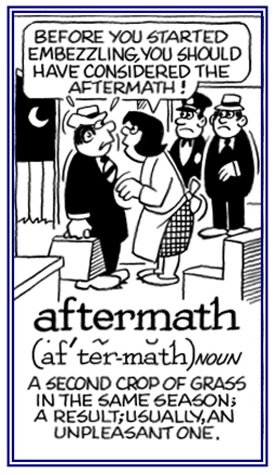post-
(Latin: after, behind, later, subsequent)
A posteriori is a conclusion which is reached by examination and analysis of the specific facts, as happens in a science laboratory, where a person reasons from actual observation of data and comes to a conclusion from the observed facts. Contrasted with a priori.
There are some countries which are still trying to rebuild their economies in the aftermaths of attacks by terrorists.
2. Etymology: Originally, and literally, an aftermath was a second crop of grass or similar grazing vegetation, grown after an earlier crop had been harvested in the same season.By the mid 17th century, it had taken on the figurative connotation of "resulting situation" which is now its primary meaning.

Go to this Word A Day Revisited Index
so you can see more of Mickey Bach's cartoons.
The traditional date for the founding of Rome is 753 B.C. Equivalent to A.U.C.
Also interpreted to mean: "The sins of the fathers." Is it possible that what we say and do now may affect future generations?
An ex post facto law is one which sets a penalty for an act that was not illegal at the time it was performed. Such laws are forbidden by the United States Constitution.
2. The use or awareness of subtle shades of meaning or feeling; especially, with references to artistic expressions or performances: The pianist performed the pieces with complete mastery of all of the nuances of the tones in the music.
3. A subtle deviation in meanings, opinions, or attitudes; hence, a slight degree of perceivable variations in anything apparent to the mind: The contrasts in the appearances of the twin boys was only detectable if given close attention; since there were only very slight nuances in details that revealed their individualities.
4. Etymology: from French nuance, "slight difference, shade of color" (so called with reference to the dissimilar colors of the clouds); from nuer, "to shade"; from nue, "cloud", from Gallo-Romance nuba; from Latin nubes, "cloud"; related to obnubere, "to veil".

Go to this Word A Day Revisited Index
so you can see more of Mickey Bach's cartoons.
2. Information or a message placed where the public can see it: People could see the posts on the walls of some buildings in town that were advertising the musical presentation at the auditorium.
3. Information that is presented on the internet: The site received several posts about its condemnation of the new senator.
4. Etymology: from Latin positum; from ponere, "to place" or "to put".
Used in medical prescriptions as directions for proper consumption after meals.

